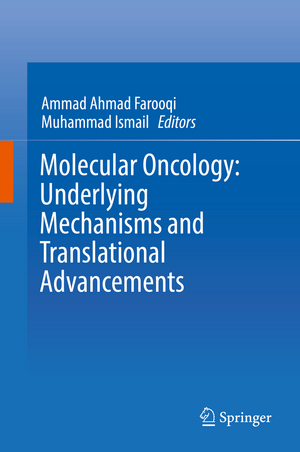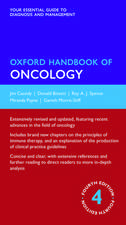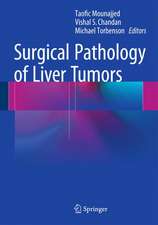Molecular Oncology: Underlying Mechanisms and Translational Advancements
Editat de Ammad Ahmad Farooqi, Muhammad Ismailen Limba Engleză Hardback – 5 apr 2017
Cancer is a multifaceted and genomically complex disease and data obtained through high throughput technologies has provided near complete resolution of the landscape of how genomic, genetic and epigenetic mutations in cancerous cells effectively influence homeostasis of signaling networks within these cells, between cancerous cells, tumor microenvironment and at the organ level. Increasingly sophisticated information has helped us in developing a better understanding of the underlying mechanisms of cancer, and it is now known that intra-tumor genetic heterogeneity, cellular plasticity, dysregulation of spatio-temporally controlled signaling cascades, and loss of apoptosis are contributory in cancer development, progression and the development of resistance against different therapeutics. It is becoming progressively more understandable that earlier detection of pre-existing or emerging resistance against different therapeutics may prove to be helpful in personalizing the use of targeted cancer therapy.
Despite the fact that there is a continuously increasing list of books, being guest edited by researchers, books on the subject are often composed of invited reviews without proper sequence and continuity and designed for a particular readership. This book progressively shifts and guides the readers from basic underlying mechanisms to translational approaches to treat cancer.
| Toate formatele și edițiile | Preț | Express |
|---|---|---|
| Paperback (1) | 779.73 lei 43-57 zile | |
| Springer International Publishing – 21 iul 2018 | 779.73 lei 43-57 zile | |
| Hardback (1) | 1102.10 lei 43-57 zile | |
| Springer International Publishing – 5 apr 2017 | 1102.10 lei 43-57 zile |
Preț: 1102.10 lei
Preț vechi: 1160.10 lei
-5% Nou
Puncte Express: 1653
Preț estimativ în valută:
210.88€ • 220.77$ • 174.49£
210.88€ • 220.77$ • 174.49£
Carte tipărită la comandă
Livrare economică 07-21 aprilie
Preluare comenzi: 021 569.72.76
Specificații
ISBN-13: 9783319530819
ISBN-10: 331953081X
Pagini: 306
Ilustrații: X, 302 p. 27 illus., 24 illus. in color.
Dimensiuni: 155 x 235 x 19 mm
Greutate: 0.61 kg
Ediția:1st ed. 2017
Editura: Springer International Publishing
Colecția Springer
Locul publicării:Cham, Switzerland
ISBN-10: 331953081X
Pagini: 306
Ilustrații: X, 302 p. 27 illus., 24 illus. in color.
Dimensiuni: 155 x 235 x 19 mm
Greutate: 0.61 kg
Ediția:1st ed. 2017
Editura: Springer International Publishing
Colecția Springer
Locul publicării:Cham, Switzerland
Cuprins
- Microtubule targeting agents in cancer therapy: Elucidating the underlying molecular mechanisms.- Adenosine signaling pathways as potential therapeutic targets in cancer disease.- Anticancer activities of Hippophae rhamnoides: Journey from Benchtop to the Bedside.- Emerging role of ncRNAs in cancer biology: techniques for diagnostic monitoring and potential ncRNA-based therapies.- Clinical and translational research on the pathophysiology of several ocular tumors types.- Exosomes and cancer: from diagnosis to therapy.- Blood-based Cancer Detection: Towards Solving Diagnostic Puzzle.- Non-coding RNAs, Critical Therapy Targets against Cancer - Detection of Virus-caused Cancer in Publicly Available Next Generation Sequencing Data.- TRAIL mediated signaling in prostate cancer.- Index.
Notă biografică
Ammad Ahmad Farooqi is currently a Senior Scientist at the Institute of Biomedical and Genetic Engineering (IBGE), in Islamabad, Pakistan. His area of research is tightly focused on cancer genetics and therapeutics.
Professor Muhammad Ismail has a Ph.D. in Biotechnology and is currently the Director of the Institute of Biomedical and Genetic Engineering (IBGE), in Islamabad. His main focus of research is Cancer Genetics and Therapeutics, Nanomedicine and Pharmacogenomics.
Professor Muhammad Ismail has a Ph.D. in Biotechnology and is currently the Director of the Institute of Biomedical and Genetic Engineering (IBGE), in Islamabad. His main focus of research is Cancer Genetics and Therapeutics, Nanomedicine and Pharmacogenomics.
Textul de pe ultima copertă
Cancer is a multifaceted and genomically complex disease and data obtained through high throughput technologies has provided near complete resolution of the landscape of how genomic, genetic and epigenetic mutations in cancerous cells effectively influence homeostasis of signaling networks within these cells, between cancerous cells, tumor microenvironment and at the organ level. Increasingly sophisticated information has helped us in developing a better understanding of the underlying mechanisms of cancer, and it is now known that intra-tumor genetic heterogeneity, cellular plasticity, dysregulation of spatio-temporally controlled signaling cascades, and loss of apoptosis are contributory in cancer development, progression and the development of resistance against different therapeutics. It is becoming progressively more understandable that earlier detection of pre-existing or emerging resistance against different therapeutics may prove to be helpful in personalizing the use of targeted cancer therapy.
Despite the fact that there is a continuously increasing list of books, being guest edited by researchers, books on the subject are often composed of invited reviews without proper sequence and continuity and designed for a particular readership. This book progressively shifts and guides the readers from basic underlying mechanisms to translational approaches to treat cancer.
Caracteristici
This book progressively shifts and guides the readers from basic underlying mechanisms to translational approaches to treat cancer. This book will present molecular basis of cancer development, progression and development of resistance against wide ranging therapeutics information Book is appropriately designed for established oncologists, basic and medical students and pharmaceutical industry associated R&D departments Useful for training graduate medical students Includes supplementary material: sn.pub/extras











